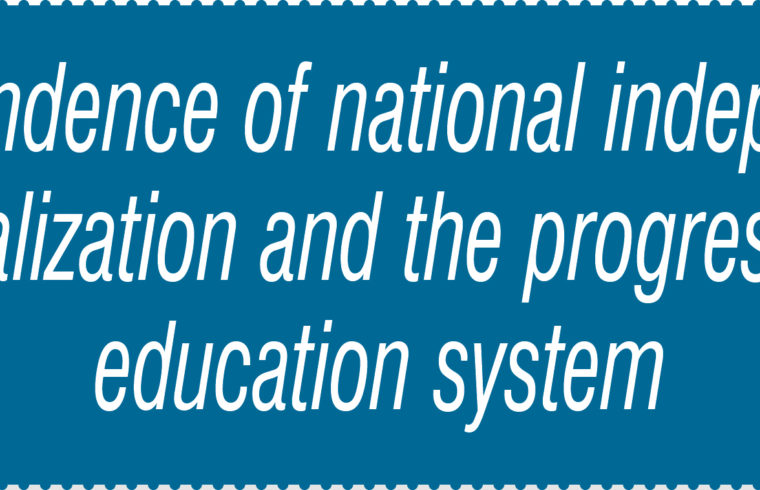Evans Kaganizo Mutesasira
President General, Uganda Liberal Teachers’ Union (ULITU) – UGANDA
Three major concepts come out on this topic:
(a) Interdependence of National Independence
(b) Industrialization
(c) Progress of the Education System.
A brief definition of the concepts will be given, then an extended discussion given on how the two main variables impact on the third variable (the progress of the education system).
My discussion largely centres on the global perspective though, with attention to the developing world especially in Africa.
Interdependence of National Independence refers to how nation states depend on one another in order to achieve their development and sustainability goals.
A two Nation category is also considered in my discussion; the developed/affluent nations on one side, the weaker and developing Nations on the other.
Industrialization in this discussion, is considered as the growth of industries in a given country or nation for development; while the progress of the education system refers to how the various components of the education delivery process grow positively to fulfill the desired education goals of any country; baring on the generally acceptable global standards, focusing on the quality of education.
Since many theorists, globally consider education as “… a key to the realization of most of the goals and targets of 5 Global Sustainable Development Goals (SDGs) (Saeed Adam, et al (2013), a good and progressive education system must be looked at in the aspects of; access, retention, affordability, relevancy, with gender equity, bridging social class gaps, ensuring sustainability against any forms of negative discrimination as in culture, state or class; towards, towards national building with values such as integrity, openness, and against all forms of corruption; and developing closer global partnerships and bringing closer nations into a coherent World Community.
With the above conceptual background, I now go ahead to give a detail of how the two (above explained) variables impact on the progress of the education process.
Our global education system is challenged with high levels of school dropout.
This is at both basic and higher levels of education, with the developing world and more so Sub-Saharan Africa taking the lion’s share.
According to UNESCO (2012), Africa bags a school dropout rate at basic level of 42%, with individual countries varying in their proportions, for example, Uganda at 72%, Angola at 68% respectively, among others. The rate at which learners dropout of school has been described as alarming (UNESCO 2013). Nation interdependence and industrialization would call for more campaign for an education system with a higher retention level aiming at 0% dropout.
Interdependence of national independence and industrialization can also provide an opportunity where success stories in some nations (especially the developed world) can be shared to help bridge the education system gaps in the developing nations; A case in point is where bilateral co-operation can aim at popularizing policies in education, like cost-cutting to ensure access, and vocationalisation to ensure education relevancy and job orientation to reduce on the dropout rates.
For example, German co-operation through various nation-based agencies such as World Bank have been providing technical and financial support to the developing world aimed at developing practical skills in the education system. This is extremely crucial in the reorientation of the education system in the developing world which has been mainly theoretical and resulting in creation of more job-seekers, than job-makers, hence clogging the labour market with the less employable school graduates. A progressive education system must produce graduates ready for jobs on the market.
Growth of industries in nation states can also help to improve on the education system by providing equipment highly needed in the learning and the teaching process. Things like computers and all sorts of laboratory equipment can be easily produced to support a progressive education system. This makes education relevant as it is practical and field-oriented.
Interdependence also implies that some of the education values can be shared across the globe to improve the entire education system on the globe. For example, values like reduction of gender disparity in the access and retention of the learners/children in various communities.
The phenomenon can also lead to a situation where training of education manpower can be easily developed and shared across the globe with desired competences and values to pass on to the young/learning generation. Exchange valuation programmes can be encouraged across nations/regions and at continental levels to achieve such purposes.
At progressive education system further entails the aspect public funding and public control/ guidance of the education institutions in a given nation. This can be achieved through nation interdependence as well as through industrialization.
In most of the developing world, especially in Africa (ranging between 3% to 6%), education budgets constitute a very small portion of the national budget, attention being given to the military and governance sectors exclusively. Much of education funding in low-income countries is through development support from philanthropic organisations.
This can be greatly improved through deliberate campaigning to ensure education takes up her due share of the national budget and reducing wastage, which reduces education costs at the household level.
Cooperation across independent nations and industrialization can also be very relevant in the global fight against privatization and commercialization of education, especially in the developing world and more so in Africa.
This has greatly watered down the quality of education, where it is looked at a commodity to be purchased at an escalating price, than a service and public good, and a fundamental human right.
Success stories of free and quality public education in the developed world, talk of USA, Germany, Canada, the Netherlands, can be shared with the developing world to have a free and accessible quality education across the entire globe. This is in line with fulfi lling the SDG No.4 (education) and 7 (cooperation). Interdependence of National independence and industrialization can do hel in the governce sector of different countries; which can directly result into a wonderful progress in the system of education.
Governance values like democracy, positive prioritization, transparency can be easily shared across the globe, especially between the developed, free and industrialized countries; with the developing and controlled countries.
Interdependency and industrialization can help to overcome cultural barriers to education. Industries/factories bring together people of diverse backgrounds to work. This leads to growth of new ideas and new outlook to life – this paves the way for an education that is all inclusive and avoid unnecessary biases and prejudices. This is also implied when different countries come together for sharing on education development.
International cooperation and industrialization can also make a good deal in the development of the love for education as the greatest value one can have in one’s life time. This value can help in overall access, going to school, creation of an attractive and conducive school environment that cannot be inhibitive to learners, and the parents/guardians. This can be through the provision of the necessary basic infrastructure in education/ learning centres.
The aspect of improved technology in education cannot be left out. The development of online classes, can greatly improve access through industrialization and international cooperation. This calls for the technical support and training of both the teachers and learners especially in the developing world as well as budgeting for study equipment for all the learners and teachers, especially in higher education in designing access to online education.
This greatly overcomes the physical barriers to education of quality as in aspects of travel, accommodation and larger physical classes and increases the teacher/learner ratio, as bigger online classes can be handled by one teacher or expert. It also increases sharing of knowledge and skill across regions with limited limitations.
In a nutshell nations interdependence and industrialization play a key role in the progress of the education system globally; giving ground for key factors that bring about the desirable and sustainable education system such as access, affordability, sustainability and geared towards sustainable development of the global community.





Comments
Comments are closed.